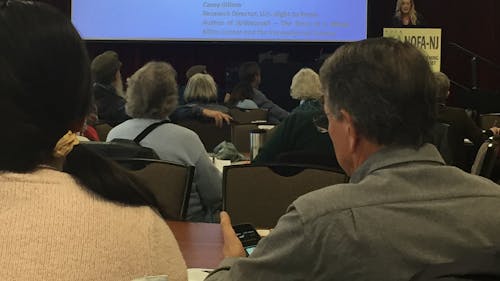Conference at Rutgers promotes organic food production, agricultural collaboration

More than 100 people, from students to farmers and commercial agriculture producers, gathered at the Douglass Student Center last weekend for the 29th Annual Winter Conference, hosted by the Northeast Organic Farming Association-New Jersey (NOFA-NJ).
Over the course of two days, the conference aims to connect gardeners and farmers with experts working in organic production, said Arianna Lindberg, a professor in the Department of Landscape Architecture and liaison between NOFA-NJ and Rutgers University.
Throughout the rooms and lounge of the student center were presentations and workshops from a variety of different agricultural experts. Some of the workshops were science-based, such as one that explained how plants extract nutrients from soil microbes, while others were about business, such as a workshop that taught the basics of farm tax and accounting. Lindberg said the conference this year offered five different tracks: business, livestock, crops, gardening and policy.
“This is ... a great networking opportunity for individuals and groups in the organic production community that can foster a really fantastic collaboration,” she said.
The focus of the conference was organic produce, which is important because New Jersey imports a large amount of organic foods from other states and countries that could be produced locally, said Joseph Heckman, a professor in the Department of Plant Biology.
“The long-standing mission of NOFA-NJ is to support local, organic and regenerative farmers though education programing,” he said.
It is also the first time in four years that the conference offered workshops regarding business. Heckman said while farming may be a hobby for smaller organic farms, for most it is considered a business that needs profits to remain economically viable and sustainable.
The keynote speaker for the Saturday program was Carey Gillam, a journalist and researcher who reported on aspects of the agriculture industry such as biotech crop technology, pesticide product development and the impacts of food production on the environment.
Her presentation, “Decades of Deceit: A Critical Eye on Pesticides, Science and Industry," discussed the agriculture company Monsanto’s practice of ghostwriting scientific research papers. Gillam said in order to convince consumers that the herbicide glyphosate, an ingredient in some of Monsanto’s products, was safe, the company’s scientists edited and drafted independent research papers.
But other research, notably from the International Agency for Research on Cancer, indicated that glyphosate was a human carcinogen, and was the contributor to diseases such as cancer and Alzheimer’s disease. The herbicide was also shown to decrease cognitive function and increase behavioral problems in children.
The keynote speakers for the Sunday program were David Montgomery and Anne Biklé, a couple who are also writers of several environmental books. At a panel titled “Growing a Revolution,” they spoke about ideas and information in the areas of soil health, farming, healthy food and farm livelihoods.
As for the possible influence on students, Heckman said the conference was a way for young people to learn about and find careers in organic farming without ever actually growing up on a farm. Some possible careers were supporting roles such as becoming inspectors for the United States Department of Agriculture (USDA) or working in marketing for organic foods.



